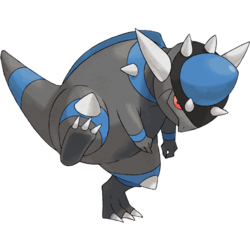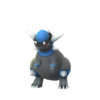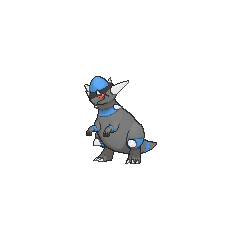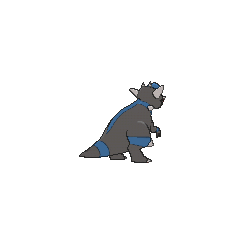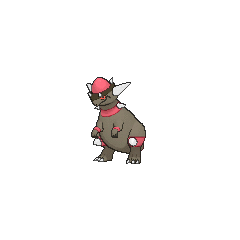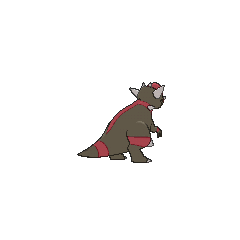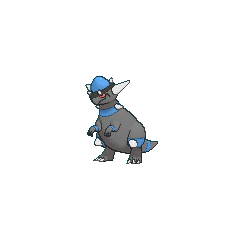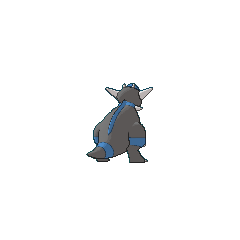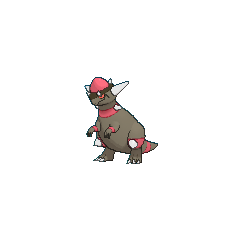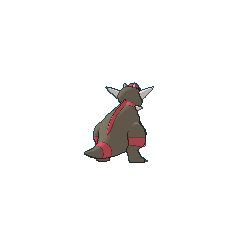From Bulbapedia, the community-driven Pokémon encyclopedia.
|
|
| Line 45: |
Line 45: |
|
| |
|
| ==Biology== | | ==Biology== |
| Rampardos is a large, dark-gray dinosaur-like Pokémon resembling a {{wp|Pachycephalosaurus}}. It has a dome head, which obstructs its red eyes. It has blue stripes, one on its tail and one on each of its knees and wrists. It has various spikes: one on each knee, two on its blue collar on its neck, two short ones on its nose, and four on its head. Two of these head spikes are bigger than the other two. | | Rampardos is a large, dark-gray dinosaur-like Pokémon resembling a {{wp|Pachycephalosaurus}}. It has a dome head, which obstructs its red eyes. Its nose and mouth resemble a craggy beak. It has blue stripes, one on its tail and one on each of its knees and wrists. It has various spikes: one on each knee, two on its blue collar on its neck, two short ones on its nose, and four on its head. Two of these head spikes are bigger than the other two. |
|
| |
|
| Its strength lies within its fierce head-butting attacks. A charging Rampardos can knock down virtually anything with one hit. 100 million years ago, it lived in jungles, where it tore down jungle trees while catching prey. It enjoys barging into objects with its head to train its strength and reflexes. This resulted in its skull becoming harder than steel and a foot thick, which prevents it from fainting if it crashes into anything, even another charging Rampardos. In ancient times, people would dig up its well-developed skull fossil and use it as a helmet. However, because its skull became so thick, its brain also became even smaller than that of {{p|Cranidos}}, lending credence to the theory that its stupidity led to its extinction. | | Its strength lies within its fierce head-butting attacks. A charging Rampardos can knock down virtually anything with one hit. 100 million years ago, it lived in jungles, where it tore down jungle trees while catching prey. It enjoys barging into objects with its head to train its strength and reflexes. This resulted in its skull becoming harder than steel and a foot thick, which prevents it from fainting if it crashes into anything, even another charging Rampardos. In ancient times, people would dig up its well-developed skull fossil and use it as a helmet. However, because its skull became so thick, its brain also became even smaller than that of {{p|Cranidos}}, lending credence to the theory that its stupidity led to its extinction. |
Revision as of 01:36, 23 June 2019
Rampardos (Japanese: ラムパルド Rampald) is a Rock-type Fossil Pokémon introduced in Generation IV.
It evolves from Cranidos starting at level 30, after it is revived from a Skull Fossil.
Biology
Rampardos is a large, dark-gray dinosaur-like Pokémon resembling a Pachycephalosaurus. It has a dome head, which obstructs its red eyes. Its nose and mouth resemble a craggy beak. It has blue stripes, one on its tail and one on each of its knees and wrists. It has various spikes: one on each knee, two on its blue collar on its neck, two short ones on its nose, and four on its head. Two of these head spikes are bigger than the other two.
Its strength lies within its fierce head-butting attacks. A charging Rampardos can knock down virtually anything with one hit. 100 million years ago, it lived in jungles, where it tore down jungle trees while catching prey. It enjoys barging into objects with its head to train its strength and reflexes. This resulted in its skull becoming harder than steel and a foot thick, which prevents it from fainting if it crashes into anything, even another charging Rampardos. In ancient times, people would dig up its well-developed skull fossil and use it as a helmet. However, because its skull became so thick, its brain also became even smaller than that of Cranidos, lending credence to the theory that its stupidity led to its extinction.
In the anime
Major appearances
Roark's Cranidos evolved into a Rampardos in Wild in the Streets after being trapped in Meowth's net. It battled Ash during his rematch Gym battle in the next episode. During the battle, Rampardos defeated Aipom and Pikachu before being defeated by Turtwig. It reappeared for a second time in Ancient Family Matters!, where it fought Byron's Bastiodon, but the battle was interrupted by Team Rocket before an outcome could be determined.
Minor appearances
A Rampardos appeared in the opening sequence of Zoroark: Master of Illusions.
A fossil of a Rampardos appeared in Alola to New Adventure! in the Pokémon School.
Pokédex entries
| Episode
|
Pokémon
|
Source
|
Entry
|
| DP017
|
Rampardos
|
Dawn's Pokédex
|
Rampardos, the Head Butt Pokémon and the evolved form of Cranidos. Its Headbutt attack is so powerful that it can pulverize even the sturdiest of objects with one hit.
|
| DP107
|
Rampardos
|
Dawn's Pokédex
|
Rampardos, the Head Butt Pokémon and the evolved form of Cranidos. Like a spear, its Headbutt can pierce even the strongest of defenses.
|
|
In the manga
In the Pokémon Adventures manga
- Main article: Roark's Rampardos
Roark's Cranidos evolved into a Rampardos in Brash Bronzong I, which Mr. Foreman congratulates him for.
In the Pokémon Diamond and Pearl Adventure! manga
Two Rampardos were amongst the Pokémon Charon conditioned into vicious fighting machines in Charon Must Be Stopped!.
In the Darkrai Mission Story: Pokémon Ranger Vatonage - the Comic manga
Rampardos is the Pokémon Heath controls in the manga adaptation of Pokémon Ranger: Shadows of Almia.
In the Phantom Thief Pokémon 7 manga
A Rampardos was used against Hiori and company during their final assault on Team Galactic's Base. It battled Lily's Leafeon, compensating its weakness to Grass-type attacks with super-effective moves of its own.
In the TCG
- Main article: Rampardos (TCG)
Game data
NPC appearances
Pokémon Mystery Dungeon: Gates to Infinity: Rampardos runs the Box Buster shop in Post Town, where he will break open the player's treasure boxes for 150 Poké.
Pokédex entries
| This Pokémon was unavailable prior to Generation IV.
|
| Generation IV
|
|
Sinnoh
#037
|
|
Johto
#—
|
| Diamond
|
Its powerful headbutt has enough power to shatter even the most durable things upon impact.
|
| Pearl
|
Its skull is as hard as iron. It is a brute that tears down jungle trees while catching prey.
|
| Platinum
|
If two were to smash their heads together, their foot-thick skulls would keep them from fainting.
|
| HeartGold
|
Its skull withstands impacts of any magnitude. As a result, its brain never gets the chance to grow.
|
| SoulSilver
|
|
|
| Generation V
|
|
|
Unova
#—
|
| Black
|
If two were to smash their heads together, their foot-thick skulls would keep them from fainting.
|
| White
|
| Black 2
|
If two were to smash their heads together, their foot-thick skulls would keep them from fainting.
|
| White 2
|
|
|
| Generation VI
|
|
Kalos
#—
|
|
Hoenn
#—
|
| X
|
Its skull withstands impacts of any magnitude. As a result, its brain never gets the chance to grow.
|
| Y
|
Its skull is as hard as iron, it is a brute that tears down jungle trees while catching prey.
|
| Omega Ruby
|
Its skull withstands impacts of any magnitude. As a result, its brain never gets the chance to grow.
|
| Alpha Sapphire
|
Its skull is as hard as iron. It is a brute that tears down jungle trees while catching prey.
|
|
|
| Generation VII
|
|
Alola
SM: #189
|
|
Alola
USUM: #236
|
|
Kanto
#—
|
| This Pokémon has no Pokédex entries in Let's Go, Pikachu! and Let's Go, Eevee!.
|
| Sun
|
The result of repeated headbutts is a skull grown thick and hard. However, its brain has shrunk in size compared with Cranidos's.
|
| Moon
|
Records exist of a revived fossil that evolved into Rampardos. It proceeded to escape and then destroy a skyscraper with a headbutt.
|
| Ultra Sun
|
In ancient times, people would dig up fossils of this Pokémon and use its skull, which is harder than steel, to make helmets.
|
| Ultra Moon
|
This ancient Pokémon used headbutts skillfully. Its brain was really small, so some theories suggest that its stupidity led to its extinction.
|
|
|
Game locations
| This Pokémon was unavailable prior to Generation IV.
|
|
|
|
|
|
|
|
|
In side games
| This Pokémon was unavailable prior to Generation IV.
|
|
|
|
|
|
|
Stats
Base stats
| Stat
|
Range
|
| At Lv. 50
|
At Lv. 100
|
97
|
|
157 - 204
|
304 - 398
|
165
|
|
153 - 238
|
301 - 471
|
60
|
|
58 - 123
|
112 - 240
|
65
|
|
63 - 128
|
121 - 251
|
50
|
|
49 - 112
|
94 - 218
|
58
|
|
56 - 121
|
108 - 236
|
Total: 495
|
Other Pokémon with this total
|
- Minimum stats are calculated with 0 EVs, IVs of 0, and (if applicable) a hindering nature.
- Maximum stats are calculated with 252 EVs, IVs of 31, and (if applicable) a helpful nature.
|
Pokéathlon stats
Type effectiveness
| Under normal battle conditions in Generation IX, this Pokémon is:
|
|
|
|
|
|
|
|
|
|
|
|
|
Learnset
|
|
|
|
- Bold indicates a move that gets STAB when used by Rampardos
- Italic indicates a move that gets STAB only when used by an Evolution of Rampardos
- Click on the generation numbers at the top to see level-up moves from other generations
|
|
|
|
|
- Bold indicates a move that gets STAB when used by Rampardos
- Italic indicates a move that gets STAB only when used by an Evolution of Rampardos
- Click on the generation numbers at the top to see TM moves from other generations
|
|
|
|
|
- Moves marked with an asterisk (*) must be chain bred onto Rampardos in Generation VII
- Moves marked with a double dagger (‡) can only be bred from a Pokémon who learned the move in an earlier generation.
- Moves marked with a superscript game abbreviation can only be bred onto Rampardos in that game.
- Bold indicates a move that gets STAB when used by Rampardos
- Italic indicates a move that gets STAB only when used by an Evolution of Rampardos
- Click on the generation numbers at the top to see Egg moves from other generations
|
|
|
|
|
- A black or white abbreviation in a colored box indicates that Rampardos can be tutored the move in that game
- A colored abbreviation in a white box indicates that Rampardos cannot be tutored the move in that game
- Bold indicates a move that gets STAB when used by Rampardos
- Italic indicates a move that gets STAB only when used by an Evolution of Rampardos
- Click on the generation numbers at the top to see Move Tutor moves from other generations
|
|
|
|
|
- Bold indicates a move that gets STAB when used by Rampardos
- Italic indicates a move that gets STAB only when used by an Evolution of Rampardos
- Click on the generation numbers at the top to see moves from other generations
|
Side game data
|
|
|
|
Pokémon Ranger: Guardian Signs
| Group:
|
|
Poké Assist:
(present)
|

|
Field move:
(present)
|

(Crush ×3)
|
Poké Assist:
(past)
|

|
Field move:
(past)
|

(Crush ×1)
|
| Browser entry R-051/N-174
|
| It triggers rockfalls around itself that make Pokémon Tired.
|
|
|
|
|
|
|
|
|
|
|
Evolution
Sprites
| This Pokémon was unavailable prior to Generation IV.
|
|
|
|
|
|
|
|
|
Trivia
- Rampardos has the highest base Attack stat of all Rock-type Pokémon.
- Rampardos also has the highest base Attack stat of all non-Legendary, non-transformed Pokémon, excluding Ultra Beasts.
- Rampardos and its pre-evolution Cranidos are the only Fossil Pokémon of a single type.
Origin
Rampardos is based on the family of dinosaurs known as Pachycephalosauridae, although the head ornamentation resembles that of the Stygimoloch or Dracorex because of its height.
Name origin
Rampardos may be a combination of rampart (a defensive wall), ram (to slam into) or rampage and hard. Dos is derived from Cranidos.
Rampald may be a combination of rampart or ram and hard or bald.
In other languages
| Language
|
Title
|
Meaning
|
 Japanese Japanese
|
ラムパルド Rampald
|
From rampart or ram and hard or bald
|
 French French
|
Charkos
|
From char and os
|
 Spanish Spanish
|
Rampardos
|
Same as English name
|
 German German
|
Rameidon
|
Possibly from rammen, Eidechse, and don
|
 Italian Italian
|
Rampardos
|
Same as English name
|
 Korean Korean
|
램펄드 Ramparld
|
Transliteration of Japanese name
|
 Mandarin Chinese Mandarin Chinese
|
戰槌龍 / 战槌龙 Zhànchuílóng
|
From 戰槌 zhànchuí and 龍 lóng
|
 Cantonese Chinese Cantonese Chinese
|
戰槌龍 Jinchèuihlùhng
|
Same as Mandarin name
|
|
|
|
| More languages
|
 Russian Russian
|
Рэмпардос Rempardos
Рампардос Rampardos
|
Transcription of English name
|
|
|
|
Related articles
External links

|
This Pokémon article is part of Project Pokédex, a Bulbapedia project that aims to write comprehensive articles on each Pokémon species, as well as Pokémon groups and forms.
|
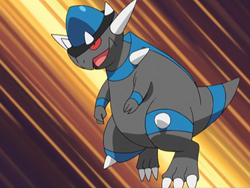
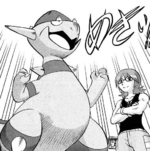
 For other sprites and images, please see Rampardos images on the Bulbagarden Archives.
For other sprites and images, please see Rampardos images on the Bulbagarden Archives.
